Best Podcasting Tools For Beginners
Launch your podcast business with tools that allow your work to flow at ease, and get quality result.
Why we recommend these tools
Choosing the right podcasting tools is crucial for success. We’ve tried various tools for our business and clients, and these stand out. They’re easy for beginners yet powerful for pros. With intuitive interfaces, recording, editing, and publishing become seamless.
Plus, they offer features like analytics to track progress and audience engagement. Customizable templates and themes give podcasts a unique identity, while automation saves time. Reliable customer support ensures help when needed. Whether you’re starting or scaling up, these tools streamline the entire podcasting process.
1 All-in-one software
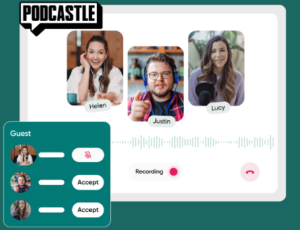
Podcastle AI is a comprehensive podcast creation and hosting platform.
It offers tools for recording, editing, and distributing podcasts to major platforms like Apple Podcasts and Spotify.
With features such as AI-powered audio enhancement, royalty-free music libraries, and seamless distribution.
4.9Pricing:
Basic – free
Storyteller – $11.99/mo
Pro – $23.99/mo
Visit site2 Best microphone

The Samson microphone line, including models like the Q2U and Q9U, offers versatile options for podcasters seeking professional sound quality.
These dynamic microphones capture rich, radio/podcast-like audio and come with essential accessories like stands and cables.
They offer USB and XLR connectivity, making them compatible with various recording setups.
Pricing:
Q2U – $70
Q9U – $100
Visit siteUsers review
What other users say about this products
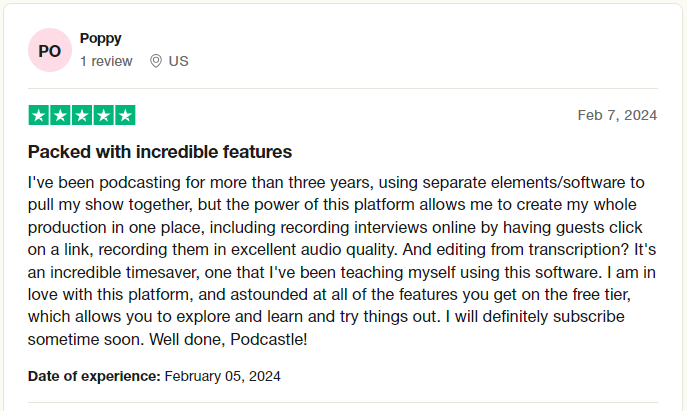
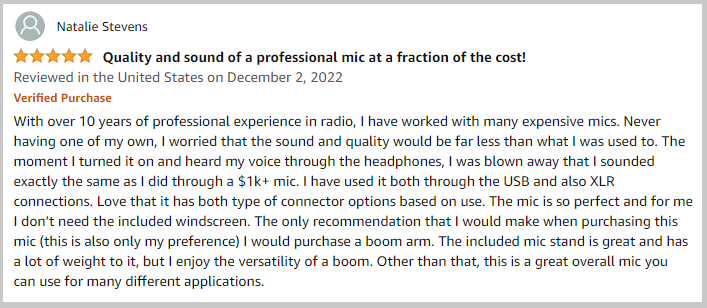
3 Best headphone
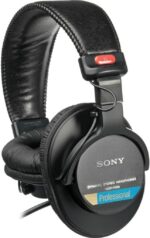
The Sony MDR7506 professional large diaphragm headphones are a mainstay for professionals, known for delivering powerful, detailed sound with their 40-millimeter drivers and neodymium magnets.
These headphones offer a large frequency response range of 10 Hertz to 20 kilohertz, ensuring clear and accurate audio representation.
4.9Pricing:
Sony MDR7506 – $99
Visit site4 Best Camera
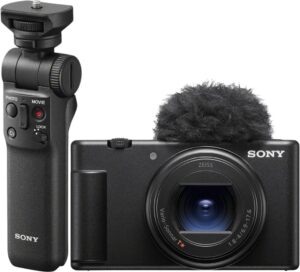
The Sony ZV 1 camera really is everything you need to get going with video podcasting, content creation, YouTube videos, and a lot more.
It connects directly to your computer and it won’t shut off when it’s connected to your computer so it’s perfect for live streaming.
The lens that it comes with is very impressive, it’s a zoom lens that ranges between 24 mm and 70 mm which gives you a lot of flexibility.
4.9Pricing:
Sony ZV 1 – $998
Visit site5 Best Recorder
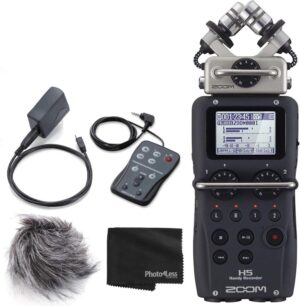
The Zoom H5 is a portable audio recorder designed for professional and semi-professional audio recording applications.
It’s part of Zoom’s popular line of handheld recorders known for their versatility, quality, and ease of use.
Audio recordings are saved directly to an SD card (up to 32GB SDHC or 128GB SDXC), providing ample storage space for long recording sessions.
4.9Pricing:
Zoom H5 – $319
Visit site6 Best mic stand
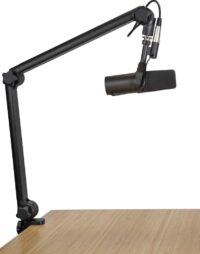
Gator Frameworks Series desktop mounted microphone boom stands are the clutter-reducing stand solutions perfectly suited for broadcasters, podcasters, content creators, radio hosts, and on-air personalities.
Each boom arm includes both a clamping and mounting base attachment mechanism to best accommodate your particular setup needs and swivels a full 360-degrees.
Pricing:
Gator Frameworks – $80
Visit siteFree Give Away
Download this eBook to learn the basic of podcasting
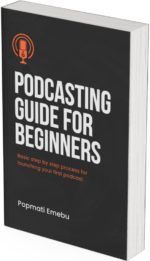 Download now
Download now
FAQ
1. What are the essential tools needed to start a podcast?
To start a podcast, you’ll need essential tools such as a microphone (USB or XLR), recording software (e.g., Podcastle AI), headphones for monitoring, and a computer or mobile device for recording and editing. Additionally, having a quiet recording space and basic knowledge of audio editing can enhance your podcasting experience.
2. What is the difference between USB and XLR microphones for podcasting?
USB microphones are plug-and-play devices that connect directly to your computer, offering simplicity and convenience for beginners. On the other hand, XLR microphones require an audio interface or mixer for connectivity, providing more control over audio quality and flexibility with professional-grade equipment.
3. How can I improve audio quality in my podcast recordings?
Improving audio quality involves using proper mic placement, investing in quality microphones and headphones, using acoustic treatment like foam panels or blankets to reduce room echo, and mastering basic audio editing techniques to enhance clarity and consistency.
4. Do I need a dedicated recording space for podcasting?
While a dedicated recording space is ideal for podcasting, it’s not always necessary. You can record in a quiet room at home, using blankets, pillows, or acoustic foam panels to minimize echo and background noise. Choose a location away from traffic, appliances, or other sources of noise. If possible, invest in a good microphone and headphones to capture high-quality audio. As your podcast grows, you may consider creating a dedicated recording space with acoustic treatment for optimal sound quality.
